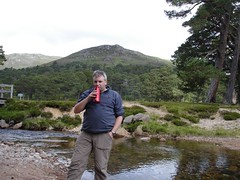- David Firth, of SaladFingers fame, was on ScreenWipe last night on BBC2. (Sorry Salima).
- "The Long Tail" being discussed on the new http://twit.tv/natn podcast. (YouTube video)
To me, this reflects the power of Web2.0. It is about sharing ideas, just-in-time learning, and creativity. A real meritocracy. Participate or not, it is your choice, just don't complain about missing out. Learn Japanese if you want. Learn how to create spheres in Photoshop if you want. Learn how to fold a lightcube if you want.
Leo and Amber described themselves as being Internet Content Creators. Not being pigeon-holed into one particular format. I thought back to the Yentob programme, where he mentioned convergence. The two ideas, memes if you will, merged, intertwingled. I had been thinking of convergence in a Web 1.0 way: the technologies coming together so that, for example, my mobile phone has a media player, so I don't need two devices. What if I think of convergence in a Web 2.0 way? The sharing, the communities, the people, the learning, the exploration, the fun, and the meritocracy is all that is important, and not the hosting technology.
Do I care that you are listening to this on a podcast? Nope. Do I care if you are using Safari on a Mac, or browsing via a mobile phone? Nope. So why should you care if this is posted on a blog, written on a forum or a wiki, in some class notes or discussed in a YouTube video. Is this not what converging technologies should be really about? Share the knowledge, share the creativity, share the power. In return you will gain new knowledge, find new creativity, and be empowered to take new strides forward.
Any media that fails to keep up has a problem. Any technology that fails to keep up has a problem. But that is their problem, and not ours.
Glory is fleeting, but obscurity is forever said Napoleon.
Do we not want our futures to be glorious? The revolution has started. Your future jobs will be affected by the new uses, the new systems, the new convergence. Software and hardware are just the tools of the trade. In the past, a joiner would use a variety of saws, chisels, and the like - today you use a variety of ICT tools to complete the job. Fall asleep, and the world keeps on moving without you. Miss work, and you need to catch up. The days of the dinosaurs are coming to an end. The new world is fast-moving, fun, slender and dangerous for dinosaurs.

If you don't understand something, ask, delve into the meme pool, visit the library; look for ideas from the past, from other technologies, merge concepts together. Stand on the shoulder of giants. There are only 26 letters in the English language, but that didn't stop William Shakespeare or Terence Alan Patrick Sean Milligan, so why should it stop you? There are fewer chords than that and even less primary colours, so why should these restrict you from being a better artist or musician?
The main restrictions are time, quality and money. Much software is legally free. Quality improves as you invest more time, or more money to buy hardware or better software. Time is the problem. You can do anything, you just haven't the time to do everything.





No comments:
Post a Comment